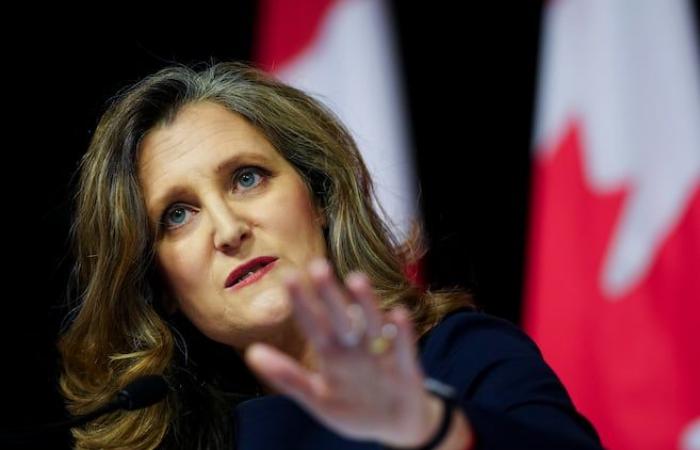In the wake of this departure, there appears to be a push to portray Ms. Freeland as either a victim or a heroine in the face of the Prime Minister's harsh decision to strip her of her Finance portfolio.
One of the proofs of this movement of sympathy is the welcome she received last Monday evening at the Liberal caucus meeting: she was warmly applauded by her colleagues. More than the Prime Minister, we are told.
Former Finance Minister Chrystia Freeland was warmly applauded by her colleagues last Monday evening when she appeared at the Liberal caucus meeting. (Adrian Wyld/Canadian Press Archives)
Another proof is the speed with which the media and political commentators took up certain passages of his resignation letter. This was notably quoted extensively: “We must avoid costly political tricks that we cannot afford and which make Canadians doubt that we recognize how serious the moment is.”
In his letter, the word “tip” is the French translation of the English word “gimmick“. But we could have used another expression: scheme, calculation, machination and even scheming. “Gimmick» therefore has a stronger connotation than cunning if we want to refer to opportunistic, electoralist behavior.
So in her letter, Ms. Freeland deplores the recent decision of her Prime Minister to give electoral gifts to Canadian voters: GST holiday for two months and sending $250 checks to all those who had an income of employment in 2023 (an initiative whose future is however uncertain in the latter case).
However, Ms. Freeland has also just used a very, very large “gimmick“. It can be found in her economic update last Monday, which she did not present, but which she nevertheless wrote or, at the very least, authorized.
This “gimmick» is the announcement of a deficit of $61.9 billion for the year 2023-2024. However, barely six months ago, the government was instead projecting a deficit of 40.0 billion.
So what happened?
The answer is that we added new expenses for the year which ended on March 31, even if there were no new expenses. In short, it is an accounting entry. More specifically, the minister added $21.1 billion to the 2023-2024 budget for “contingent expenditures”.
In itself, adding reserves for future expenses is not inappropriate. On the other hand, the fact that it is done retroactively should concern us, especially if it is a government that decides to do it.
This is worrying, because on the one hand, such writing must be done at the time when the facts are noted. If the entry for contingencies was not included in the 2023-2024 budget at the time this budget was presented, that is to say on March 28, 2023, we must deduce that at that time , that is to say almost two years ago, we had not yet seriously considered the likelihood of such an expense.
On the other hand, accountants are not unanimous about the obligation to make such entries for governments, even if Ms. Freeland in her economic update says the opposite. Some believe that the government must act like private companies and therefore include “provisions for possible expenses” in its financial statements.
Others, however, are more of the opinion that since governments can levy taxes or borrow at any time (which businesses cannot do), there is no need to use such reserves , since these governments will always have access to the funds necessary to fulfill their obligations.
Quite a difference
But in the end, what difference does it make? An amount owed is an amount owed. In all probability, we will have to pay this $21.1 billion one day or another.
Well, if your name is Chrystia Freeland, that makes a big difference. You make a good impression. You tell Canadians that the deficit was larger than expected last year, amounting to $61.9 billion, but that it will decrease to $48.3 billion this year.
If Ms. Freeland had not made this accounting entry, however, the economic update would have presented very different figures. The deficit would have been 40.8 billion last year and 48.3 billion this year. Instead of decreasing, the federal government's deficit is increasing.
Ms. Freeland has been telling us for years that we should not worry too much about deficits since they, even if they are high, will gradually decrease. Obviously, without recourse to this “gimmick» accounting, the deficits are not decreasing, far from it.






